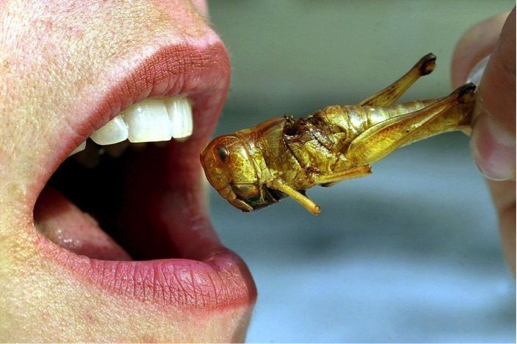
From Pests to Food – A Bug Difference

I’ve never been a fan of bugs.
They bite and sting me, mooch off my meals, and intrude upon my personal space. Kind of like my roommate.
 Some of them are creepy, crawly and often found in dirty, smelly places. Every time I see a bug, I am disgusted and annoyed.
Some of them are creepy, crawly and often found in dirty, smelly places. Every time I see a bug, I am disgusted and annoyed.
Eating them seems taboo too, but many cultures think the opposite.
In Thailand, for example, locals find bugs tasty and nutritious. Street carts give buyers a wide range of choices, similar to walking into a candy store. Some of the crowd favorites include grasshoppers (which taste like crispy chicken), water bugs (more like licorice), and silk worms (with a familiar nutty taste). Though I may be skeptical, 2 billion people eat 1,900 bug types as part of their regular diet. I can’t see myself hating all of them.
Still despite the variety, bugs have not yet captured American hearts and stomachs. Can this change?
Making Bugs Gourmet

While bug food has not yet caught on in popular American culture, there are still several restaurants you can check out.
One option is Typhoon, located in the Santa Monica Airport, which has a whole section of its menu devoted to insects.
Typhoon has considerably grown since its’ beginning in 1991 and even caught the attention of Andrew Zimmer who ate at the restaurant during his episode in Los Angeles.
The dishes are certainly eye catching, which include scorpions on shrimp toast, chambai ants with potato strings, and stir-fried silk worms. While I am not exactly salivating, they seem far more appealing served this way than without any preparation.
Seeing bugs as a delicate cuisine rather than an exotic snack is a much easier transition and one that can change our cultural perception of these creepy, crawly critters of the world.
Want to know what bugs the rest of the world are eating? Check out this cool infographic from The Seattle Globalist:
One person who hopes so is Andrew Zimmer, host of Bizarre Foods. While I may not take up Zimmer’s recommendation of dung beetles, the most bizarre thing about the show is the normalcy of insect based meals in certain parts of the world. In fact, he says most cultures find some aspects of Western diets bizarre.
“Why do we let milk rot and dry into squares and call it cheese?” Zimmer asks. “Many aspects of our dining and eating life leave the rest of the world shaking their heads.”
“I stand by the position that anyone who tried half the stuff we see on our travels would become a convert to many foods that only appear strange but taste delicious.”
But I’m not like Zimmer. I tend to stick to eating what I’m used to…unless there is some other value to having a wider culinary palette.
Did someone say, ‘It can help save the planet!?’ You had my curiosity, now you got my attention. And it’s true. Let me walk you through.
Over the next few decades, we’ll need to produce enough protein for billions more mouths while also limiting our impact on the earth’s climate. Insects could be our savior. A single kilogram of feed yields 12 times more cricket protein than beef protein.
Insects could also reduce emissions. Livestock accounts for about 15 percent of global greenhouse gas emissions, more than planes, trains, and automobiles combined. On the other hand, insects could reduce these emissions by 60 percent. Insects also don’t need as much land and water so they would be cheaper and more plentiful.
Of course, while saving the planet is nice and all, I would like to eat a healthy alternative as well. And insects deliver once again. Not only do most non-Americans find them delicious, but they are also high in protein, less fattening, and high in vitamins and minerals. Can I still avoid them after all this?
Maybe one day, I’ll see a bug and be fascinated rather than disgusted. Maybe one day, I’ll see a bug and be appreciative of its role in our ecosystem rather than a disease spreading pest. Maybe one day.
For now I can keep my irrational hatred toward bugs, but still enjoy them as a sustainable substitute for beef.
Eric Osman is a senior majoring in Journalism at The George Washington University.



















